

|
Back to |
| The Front Page |
| Letters & Opinion |
|
A Game Changing Enigma by Laurence Latham Illustrations by Deborah Latham
|
||||||
|
||||||
Back in 2012 a story by Laurence Latham entitled Reflections on Croquet in Wonderland made its appearance on Croquet World Online, having originally debuted in the UK in The Croquet Gazette; three years later came the sequel, A Singular Case of Fictional Doubles. Now Alice and her friend the Narrator have met for a third time, with another croquet mystery to solve. While each story works as a stand-alone, you can check out the first two stories on the links above, if you want some background context for the characters.
Mathematics and Mallet Antics
"You'd better start paying attention," whispered Alice, giving me a nudge. "They've got to ‘Any Other Business' already."
I stared at her blankly, while trying to make proper sense of my surroundings.
"Extraordinary General Meeting, remember? You agreed to help."
While I didn't doubt the fact for a minute, the issues at hand had eluded my scrambled brain and I knew this was hardly the moment to begin asking for clarification.
"We are currently faced with something of a problem," announced the March Hare, who was in the Chair. "As you all know, we're soon to move to our new ground, where we will also be getting brand new equipment.
"However, the move is conditional on our donating our old club mallets to three venues. Two of our neighbouring clubs, namely Walton-on-the-Wallow and Muchley-in-Myre, are desperately in need of more mallets. The third beneficiary is to be a local hotel, where they have expressed a keen interest in turning their ample lawn into a croquet court for use by guests."
"So, where's the difficulty? I can't see a problem with any of this," cried the White Rabbit.
"I was about to explain," said the March Hare, a little crossly, "if you'd let me finish."
"Well, do get on, then," grumbled the White Rabbit. "We're already running behind time."
"No, we're not," insisted the Chairman. "No-one's running – we're all sitting down."
"In that case we're sitting behind time," muttered the White Rabbit, "which is even worse, if you ask me."
The March Hare cleared his throat loudly. "The Terms and Conditions include a requirement to donate half the mallets to Walton, one third to Muchley and one ninth to the hotel."
"What's the good of half a mallet?" interrupted the White Rabbit again. "A third would be even less useful. As for a ninth, why, you couldn't even..."
"Quiet!" shouted the Chairman, rising to his feet. "Those are the fractions of the total number to be distributed, you oaf!"
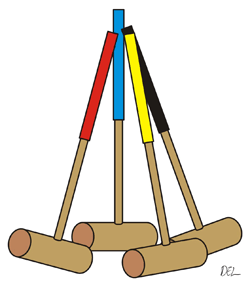
|
"However, in a roundabout way you do have a point," he conceded quietly. "We have precisely thirty-four mallets. Seventeen can go to Walton right enough, but then we run into difficulties, don't we? Thirty-four doesn't divide by either three or nine and – contrary to the belief of some – we haven't the slightest intention of splitting mallets. In any case, it would be against the Terms and Conditions."
A great deal of murmuring arose from among the Committee Members, while the White Rabbit shifted uncomfortably, but said nothing.
I took the opportunity to lean over and whisper to Alice, "If this is one of the problems you wanted me to help with, I'm hardly qualified. I was thoroughly bored with maths at school. As a matter of fact, instead of trying to concentrate, I would sometimes practise writing with my left hand."
"And can you write neatly with it as a result?"
"No."
"That really was a complete waste of time, then, wasn't it?" breathed Alice. "Anyway, as it happens I don't need your help with the maths at all, but you have brought your mallet, haven't you?"
"Yes," I said, automatically tightening my grasp upon the handle in needless self-assurance.
"Good. Do you trust me?"
"Of course I trust you. But why? What are you going to do?"
Alice stood up. "My one time Doubles Partner and I would like to donate our mallets to the club," she announced loudly, causing the rising voices to fall silent. "I think you'll find that should solve the problem, since thirty-six is divisible not only by two, but by three and nine as well."
"Hang on a minute!" I yelled, jumping up, only to find myself caught between outrage and embarrassment, as a ripple of grateful applause began to break out.
Alice was regarding me with an expression that served as an unmistakable reminder of my recent declaration of trust, while the March Hare, who had obviously been on the point of thanking us, hesitated uncertainly.
"I...I...I'd just like to confirm my support for this cause, before you take – I mean, before we give you our mallets," I stuttered, desperately hoping my hastily revised words sounded more convincing to those listening than they felt to me.
"Please allow me to express our sincere thanks," said the March Hare. "But are you sure about this? One's own mallet is a much cherished personal item that is often not easily replaced."
"Quite sure," confirmed Alice, before I had time to think. "We only ask that should you find they are no longer required you offer to return them before considering any other means of disposal."
"Of course," promised the March Hare. "We really are most grateful."
As Alice and I parted with our mallets I tried my level best to appear amenable, while contemplating the loss of a valued possession. I could see no way in which any of the proposed recipients would decide not to utilize their newly acquired equipment to the full.
Then, after the Chairman had made his closing remarks and the meeting began to break up, I made my way outside with Alice.
"I can't believe you just did that without at least discussing it with me first!" I protested. "What on earth were you thinking?"
"I didn't exactly have time to discuss it with you first, did I?" she replied. "In any case, you can stop worrying – we'll get them back."
"How's that going to happen? They'll be gone to Walton-on-the-Whatsit or Mucky – Muddy – whatever it was, and that'll be that!"
"You said you'd trust me," she insisted. "Now, please do so."
The Confusion Continues
As we walked away from the pavilion I noticed how, just like on my previous visit, it was well into the evening and too late for play. My game as Alice's doubles partner now seemed a very long time ago.
"I hadn't been to the club for quite a while until recently," she declared, "and now there's something very wrong happening but I can't make out what exactly it is that's going on. This is the other puzzle I was hoping you might be able to help solve."
"Besides giving you my mallet, you mean?"
"Besides lending me your mallet," insisted Alice.
Realizing that there was nothing more meaningful to be said on the subject, I determined to concentrate on the immediate matter in hand.
I looked out over what had once been a recognizable court, now terribly overgrown (in the most literal sense) after that wretched Knave of Spades fellow had so recklessly experimented with his special fertilizer.
Although I had long since become quite used to a world where physical dimensions seemed both perfectly acceptable yet completely wrong at the same time, I knew what Alice meant. Even in this strange place there was something which had definitely changed.
"It wasn't just the Knave of Spades," she conceded, "even though he was a right little Jackanapes. Many of the familiar landmarks are now different in an odd sort of way. Look at the station – it's a complete ruin!"
At the spot where Alice and I had once alighted from a train, there now stood nothing more than derelict buildings and a torn-up track bed.
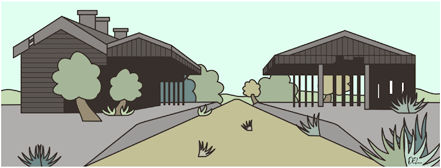
|
"Oh, no!" I exclaimed in disbelief. "What on earth has happened here?"
Even the memory of how we had gone on to join the barbeque at which the Chimneypotamus had so amusingly burned his tie and met the Ace of Spades could not override my feeling of despondency.
A tattered poster hung from a notice board attached to one of the walls and I wandered across to see what it said.
"Baulk Line Station – Notice of Closure," I read aloud. "Obviously dated quite some time ago."
"Yes," said Alice, "and that's not all. There have been lots of other things that have changed too. As I was saying, it's the second reason I asked you to return. I thought you might be able to come up with some sort of explanation which would help me to understand."
"What else has gone wrong?" I enquired, now seriously worried.
"You remember the Twobackonist's, of course? Well, come and see."
After we had been walking for a little while I began to notice the ground getting soft and slushy beneath my feet.
"Has this area been flooded lately?" I asked in surprise.
"I'm afraid it has," she said. "Very much so. Look!"
In front of us I could see the familiar building which had once been home to a thriving business, but now the blinds were drawn and it was obvious that the shop had ceased trading.
"Did it flood in the past?" I asked with concern.
"Only very rarely," confirmed Alice. "Long ago, when I was still a girl, I remember coming here once when they only used to play a childish version of croquet up near the palace and this area had not yet become a court. Before the Twobackonist there was another business on this very same spot – I can't remember whether it was a wool shop or a grocer's – but whichever it was I ended up having to leave by boat.
"Nevertheless, flooding remained a very unusual occurrence. Now it happens with increasing regularity. In fact that area of slightly raised ground around the old Twobackonist's shop has become known as Blue Doors Eyot."
"Oh, you mean a small island, like Chiswick Eyot in the Thames?"
"Yes, that's right. Its being surrounded by water so frequently these days is the main reason we're moving. But it still doesn't explain all the odd things which were already happening."
We stood there together for a few moments regarding the rather sorry scene while Alice appeared to be lost in thought.
"Perhaps Peg will be able to throw some light on the situation," she suggested hopefully. "She always seemed to know quite a bit about what was going on."
It was time to progress and Alice led me toward the north east. We walked in silence for what seemed like a considerable distance but there was no sign of Peg.
"She must be around somewhere; I'm sure this is the right area," said Alice at last.
At that moment we saw a mysterious shape approaching and a few seconds later Alice was introducing me to a rather large Walrus.
"Have you seen Peg?" she asked somewhat urgently, once the pleasantries were over.
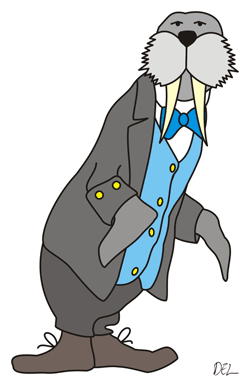
|
"Gone?" repeated Alice in astonishment. "She can't have!"
"Well, she has," confirmed the Walrus. "Went a little while ago. I'm surprised you didn't know."
"This is even worse than I thought," moaned Alice. "What on earth is happening here?"
"Peg pretty much lost interest," explained the Walrus patiently. "She stopped getting personally involved like she used to – more or less gave up deliberately hitting people, saying she often felt like she was only in the way."
"Whatever is she doing now?" asked Alice, in a subdued voice.
"Took up some sort of art, I believe," sighed the Walrus. "Now what was it she called it? Oh, yes, that's right – Post Impressionism."
"But we can't play without Peg!" protested Alice.
"Oh, you needn't worry on that score, at least," the Walrus reassured her. "She wasn't so thoughtless as to simply dump us. She's left a marker which will serve just as well – it's around here somewhere, I know."
Sure enough, we soon found a tall multicoloured sculpture, which indicated that we were standing at the very centre of the court.
"You see," the Walrus pointed out, "like I told you, she didn't abandon us entirely."
"It's not really the same," said Alice. "Not the same at all. Oh dear, oh dear!"
"I'm very sorry," said the Walrus, after a suitably polite pause, "and I've no wish to appear heartless, but I'm getting too long in the tusk for all this worry. I really must be on my way."
"What shall we do now?" asked Alice.
I was trying hard to think of something constructive when I noticed a distant flashing light and remembered Trinity House.
"What about heading up toward the lighthouse?" I suggested. "At least that looks to be functioning as normal."
Alice agreed, so we set off once again. However, we had only been walking for a very few minutes when we saw another figure approaching, and one who, I could not help feeling, looked decidedly fishy.
"Good evening," said Alice. "I don't think we've met."
"Whiting's the name," came the reply, in a distinct West Country burr. "I'm one of the Sea Class players."
"Oh, yes. I think I've heard of you, actually." Alice was doing her best to sound encouraging, but our passer-by interrupted with obvious haste.
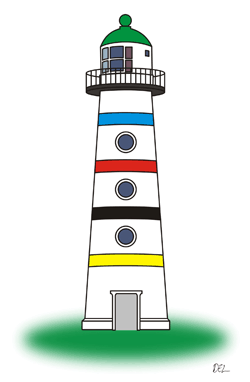
|
"Why ever not?" demanded Alice. "I've been there before. In fact, I have to say I thought it quite benign."
"Arr, well – at first, maybe," agreed the Whiting character, "but don't push your luck. 'Tis easy to be fooled. Conditions can change quickly. Get your approach wrong then, and like as not it'll be curtains. Why, I've heard tell as how as many as half who've tried when the light shows red have come to grief – in short order, too. It's like folks say – that there's an unlucky place, and no mistake! You'd do well to think again, in my opinion."
With that he was gone, leaving us both at a complete loss.
"Well," said Alice at last, "I don't know what that was all about, I'm sure. He's referring to Three, of course, but it's no more dangerous than anywhere else, if you ask me. My own approach has sometimes been more than a little wayward but I've never seen the light showing red."
"Is this another of those changes you've been talking about?" I asked, now feeling a little less sure of myself.
"Yes," replied Alice. "I certainly think it's something else to be added to the list." She seemed briefly lost in thought before adding, "Perhaps we should go and ask Rover – after all, he knows a lot about red."
We turned and headed back not too far from the way we had come. The twilight was deepening and I reflected on the fact that only my first visit here had been in full daylight. This was more akin to when we were searching for the answer to the doubles problem, but at least now it wasn't cold.
Before long we found ourselves standing in front of a familiar red door, but there was neither sight nor sound of the dog. In fact, there was no sign of life at all. Alice pushed at the door, which stuck after only a couple of inches.
"I thought the Carpenter fixed that the last time I was here," I observed.
"No," corrected Alice. "That was at Five – if you recall."
"Yes, I know – but surely..."
"I had to explain all this to you once before. I know you're used to Five and Rover being in the same place but at different times. Here, you have to remember, they're at the same time but in different places. It's not that difficult, really."
"Of course," I acknowledged somewhat lamely. I felt it best to say little and think even less. Instead, I helped Alice to push at the door.
This time it opened with a slight judder to reveal a small hallway, completely empty save for a hurricane lamp which hung from the ceiling.
"What on earth is this?" gasped Alice, who was clearly in a state of confusion. "What does it mean? Where's the dog?"
I could offer no answer. We stood looking at the unfamiliar scene, both as bewildered as the other.
"I don't seem to be of any help after all," I said despondently, while frantically trying to come up with a meaningful suggestion. "What about going to Three-back to see if Epsi can throw any light on the matter?"
"Why not?" agreed Alice. "She's strikes me as the sort of person who could well be in the know."
An Encounter with One or Two Cats
I was glad to have at least offered an idea of practical value and we set off once more. I still couldn't help but think of the lady we had met on my last visit as Epsi Longhammer, even though we had quickly discovered that this had been a misunderstanding.
We walked on in silence, while I contemplated how what I knew was gathering darkness seemed to have little detrimental effect on my vision. It was another example of how in this place there were things which could appear both normal and absurd at the same time.
Suddenly, there came a cracking sound from beneath my feet and I found myself sprawled on the ground. I had tripped over something which had been practically hidden in the grass. It was the signpost which on my previous visit had pointed the way to Three-back.
"Oh, no!" cried Alice. "This isn't right. Why has that been taken down?"
"I hope it's not because Epsi no longer wants visitors," I replied nervously. "Anyway, it can't be too far now, so we'll soon find out one way or another."
Upon reaching the door I pushed it open and was about to call out when we both jumped at the sight of a man standing just inside. Dressed in outdoor clothes, he was clearly about to leave.
"Vot do you vant?" he asked brusquely, in a strong German accent. "Play iss ofer for today!"
"We were looking for Epsi," I explained uneasily. "Is she here?"
"Nein!"
"This is Three-back, isn't it?" asked Alice, now very confused.
"Nein!" repeated the German, as he walked straight past us and out into the night.
"Well, what do you make of that?" I spluttered rhetorically.
"It's another example of the things I've been trying to explain." Alice sounded rather disconsolate. "It just keeps happening. Where's Epsi? Where was Rover?"
"Let's take a quick look round while we're here. Maybe there'll be some clues," I suggested, more in hope than expectation. "Then, perhaps, while we're in the area we could try finding Four."
The hall table was still in place but instead of the jar of Greek honey, which we had found on our previous visit, there now stood an empty beer tankard. Once again, we were no further forward.
"What are you two doing?" asked a strange voice.
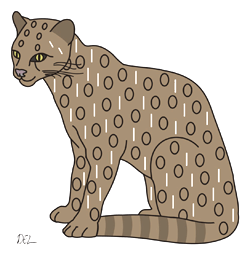
|
"We're just looking round," said Alice, appearing to take the situation completely within her stride.
"No you're not!" retorted the cat. "You don't look round at all. Now croquet balls, on the other hand, look round all the time. That's why they so often miss things. Instead of watching where they're going, they're too busy looking round. It can make people very cross sometimes, you know, and then something else ends up getting the blame. Why, only the other a day I saw a completely innocent mallet get thrown into the hedge..."
"All right, you've made your point!" said Alice loudly. "What kind of cat are you, anyway?"
"I'm an onalot."
"I've heard of an ocelot," I offered hesitantly. "What's an onalot?"
"Quite similar but with a propensity for chatter. Sometimes I find myself going on and on and..."
"Yes, thank you. I think we get the picture," interrupted Alice.
"My name's Erwin, by the way," continued the onalot, "as an acknowledgement to a well-known fictional feline."
"One who's still around?" I asked, hoping it wasn't a tactless question.
"Well, that's debatable. In one sense you could certainly say yes, but then again you might say no." Erwin's reply was so unexpected as to replace my uncertainty with utter bewilderment. I was clearly not on the right wavelength and felt it safer to change the subject.
"We're trying to get to Four," I explained. "Can you please give us some directions?"
"Round the back," said Erwin simply, creditably determined not to lapse into verbal excess. "But you can't get to it through here, mind."
"I know, Alice has explained all that. We'll be on our way."
Erwin curled up on the floor, put his head on his paws and closed his eyes. "Perhaps I'll see you there, then," he mumbled sleepily.
"Follow me," instructed Alice, as we made our exit. "We'll try walking round in a big circle after we lose sight of Three-back."
I recalled what Epsi had said about not wanting to poke about around the rear of her place at night, even though there was apparently nothing there. I found myself lost in thought, wondering how we would find Four and what might be awaiting us when we got there.
I suddenly realized that I had little recollection about that original Looking Glass game when Alice and I had made such rapid progress through the later stages on our way to One after leaving Number Six. The Prisoner had had us concentrating so firmly on making it past Number Two that everything else had become a blur. I could remember nothing about Five or Four, or even the lighthouse at Three.
All at once, my musings were cut short by the sound of Alice's voice.
"I think we can start curving round to our left now," she announced confidently.
Automatically, I glanced over my shoulder and sure enough the building where we had hoped to find Epsi had disappeared from view.
A few minutes later and we were approaching another mysterious structure. Missing it entirely during our search for a solution to the doubles problem had turned out very much to our advantage and this was the first time we had seen it at night. We entered through the large open door to find a dimly lit interior.
"This is a stables," said Alice in surprise. "I don't remember this. Perhaps it was different when we were last here."
"Presumably, these places must change from time to time," I replied. "I mean, think of what's happened with the Twobackonist and Rover."
"Look!" said Alice. "Four stalls, but all empty. The horses must be out."
There was something at the back of my mind and I was aware of an increasing feeling of unease as I studied our surroundings, when a different and totally unexpected voice made me jump.
"You managed to find your way here at last, then."
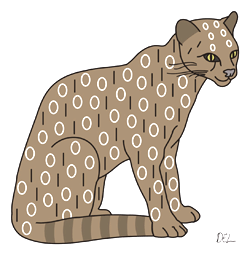
|
"Erwin!" I exclaimed. "How did you get here so quickly?"
"I don't know for certain that I did," he replied. "I've been here for some time and can't remember whether I arrived quickly or slowly. I'm always on the lookout for a super position in which to sleep, so I go to lots of places, you know. Always off somewhere, that's me. That's why they call me an offalot."
"I thought you said you were an onalot," I protested.
Erwin rose to his feet and stretched. "Onalot and offalot. Now and then. Here and there. Think about it, if you must – but not too hard and not too long," he declared and vanished, as felines are wont to do, without so much as a farewell.
Meanwhile, Alice had been examining the four stalls. "I'm sure this reminds me of someone I once met," she said ponderously. "I wonder if these colours mean anything?"
In all the time I had been in this strange place I had never really felt afraid of anyone or anything I might meet, regardless of whether or not they belonged solely to Alice's world of fiction, but now I was not so sure.
"I really think we ought to get out of here right away," I said.
Alice must have sensed the note of urgency in my voice, for she joined me in heading for the door without hesitation. We were almost at the entrance when we heard the sound of approaching hooves and I felt myself turning pale as a white horse came to a halt directly in front of us and stood blocking our way.
At this point, my private speculations over the possible identity of the four horses and their riders were mercifully laid to rest.
"What on earth are you doing here?" asked Alice, immediately recognizing the White Knight.
"This is where we come to rest up after a gruelling day on the chessboard," he explained amiably. "The others should be along soon – but don't worry, we're all friends once each game is over. There won't be any fighting here, I promise you!"
Sure enough, it wasn't long before his comrade in arms arrived along with their two adversaries, the Red Knights.
"Well, it's lovely to see you again," said the White Knight, also offering a polite nod in my direction. "But, if you don't mind, we'd all rather like to go in and get out of this armour."
We stood aside as they filed past before making our way outside once more.
"You seemed a bit worried all of a sudden, back there," said Alice, after we had walked a little way. "Is everything all right?"
"Yes, thank you," I replied, feeling slightly self-conscious. "I must confess I allowed myself to become unnerved by my own speculations, but never mind. I certainly hadn't been expecting your friend the White Knight to appear. He seems a pleasant sort of chap."
"Yes indeed," agreed Alice. "He certainly helped me on my way to becoming a queen when I played chess here as a child. I have to say, I hadn't realized the two games were now played so close to one another."
I punched the air gleefully and Alice looked at me in amazement.
"What is it?" she asked, incredulous.
"I've got it!" I declared, barely resisting the temptation to jump up and down in excitement. "The two games – that's it, of course! How could I have been so stupid? How many clues did I need?"
"What are you talking about?"
"I know what's going on. I've just worked out what it is that's happening here!"
"Well, I hope you're going to tell me right now!" exclaimed Alice.
"Golf Croquet!"
"What's Golf Croquet?"
"It's a variation of the game we play, which is officially called Association Croquet."
"Is it something new?" asked Alice. "I'm sure I've never heard of it."
I tried to explain. "It's not actually new in itself. In fact, the idea has been around for ages but it's undergone some radical changes in recent years and has become quite popular."
"Do you play?"
"No. Well, I did a few times under the old rules, over forty years ago. But not since it was modernized. I'd need someone to teach me all the new rules and tactics now."
"I see," said Alice. "But what exactly has Golf Croquet got to do with all the changes we found?"
"Oh, dear! Where to begin?" I hesitated. "Well, first, there are the hoops. That's really what made me think of the answer."
"What about the hoops?" pressed Alice. "Aren't they still all in the same places?"
"Yes, but they're numbered differently. One to Six are still the same, but One-back to Rover have been replaced by Seven to Twelve. For example, Two-back has become Eight."
"So that's why the Twobackonist isn't there any longer!"
"Precisely," I agreed, "and the new name should have given me a clue. It's not only due to the flooding, after all."
"And Epsi at Three-back?" Alice continued. "That German could have been a little more helpful, despite there being something of a language barrier."
"True. Although we misunderstood. When we asked if Epsi was there, he said Nein. But then, when we asked if we were at Three-back, what he must actually have said was Nine."
"And Peg and Rover?" Alice went on, hardly giving me time to think. "They've just disappeared!"
"Peg's not part of the scoring game anymore, so no wonder she was feeling she could only get in the way. As for Rover, the lamp was the clue – a hurricane is Force 12 on the Beaufort Scale."
"Wait a minute, though," insisted Alice. What was all that fuss the Whiting fellow was making? The lighthouse hasn't changed."
"Not as Three, it hasn't," I explained. "However, if my understanding is correct, in many games of Golf Croquet the winner is the first to score seven, so if after twelve hoops the score is tied at six all, they have to play an extra point."
"And..?"
"They must go back to Three, which becomes Thirteen, where someone has to lose the game. Hence the folklore that it's an unlucky place where half those who venture there end up wrecked!"
"I see. Well, I think I do. But why did the station close? What's that got to do with anything?"
"The Baulk Line fell into disuse with the advent of Golf Croquet, It's as simple as that, so no more railway, I'm afraid."
"It's an awful lot to take in," said Alice thoughtfully. "So much has happened since I last came here to play, but thank you for explaining it all."
She fell silent for a few seconds before suggesting that we return to the pavilion.
Perplexity over Prizes
"Oh, good, there you are!" smiled the March Hare, as we re-entered the clubhouse. "Thank you so much. What a great idea, but I can't even pretend to understand. Anyway, let me get you your mallets."
With that he hurried off to the office to fetch them, while I experienced a veritable plethora of emotions, and Alice and I exchanged glances.
When the March Hare came back carrying our mallets, Alice proceeded to offer her explanation.
"Making our donation meant that, instead of only thirty-four club mallets, there were then thirty-six. This enabled you to make the required distribution.
"You set aside half of them, that is eighteen, for Walton-on-the-Wallow. Similarly, you then set aside a further third of the original total, or twelve, for Muchley-in-Myre. Finally, you put out a ninth of that same original total, that's four, of course, ready for the hotel.
"Eighteen plus twelve plus four equals thirty-four, leaving you with two mallets to spare, which you have just kindly returned to us! It's all quite straightforward, really."
The March Hare and I looked at each other, completely aghast.
"Could you show us that on the flip-chart?" asked the March Hare.
Alice picked up a marker pen and wrote out the figures.
"It's just a slight variation on an old puzzle," she explained. "It's based on an almost automatic yet completely erroneous assumption."
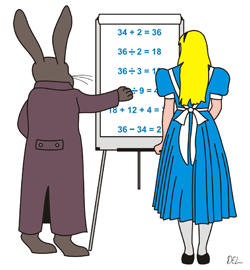
|
While Alice and the March Hare began a whispered discussion which involved much frowning and pointing at figures, the Hatter engaged me in conversation.
"I see you've got your mallet back."
"Yes indeed, and very glad about it I am too," I acknowledged. "Cost me over seven quid barely fifty years ago, I'll have you know."
"I've had mine rather longer than that," said the Hatter. "Although, I have to admit, the shaft has been changed two or three times and the head at least once. The Carpenter's usually very good with things like that. He's helped me out on a number of occasions."
I determined not to say anything about grandfathers or axes.
"I understand you've started playing Golf Croquet here," I commented.
"Yes, we have," replied the Hatter. "Do you play?"
As I had done with Alice, I briefly explained my historical connection but lack of any real knowledge of the modern intricacies.
"You ought to give it a go," encouraged the Hatter. "We're planning to arrange our own tournament soon, after we move to our new ground. You sound like you'd be a real contender for last prize!"
"Last prize?" I gasped, realizing he could hardly fail to notice my unguarded expression. "You mean like a wooden spoon?"
"Of course not," he went on. "That would be awful. It'll be something ever so worthwhile. We're thinking of a free coaching course, a really good instruction book and possibly a set of personalized bisques. All good stuff, don't you think?"
"True enough, but where I come from the best prize is usually reserved for whoever comes first. A friend of mine's son was once placed first in a painting competition open to hundreds. He won a book all about art with lots of tips and things about how to do it."
"Ridiculous!" declared the Hatter emphatically. "Are you're telling me that out of all those entrants, the one who produced the best work received a prize telling him how to do it? Surely, a prize like that would have been of far greater benefit to whoever came last. Whoever sent in the worst painting was the one most in need of help. They certainly seem to do things back-to-front where you come from, I must say!"
Silently, I had to admit to myself that his argument had a certain degree of merit.
"I suppose you're right," I conceded. "Now that I think of it, I seem to remember his father bemoaning the fact that the first prize hadn't been a car."
Alice joined us, having finished her in-depth discussion with the March Hare, who had quickly taken his leave (and possibly a headache tablet, too).
"Have you visited the new café?" enquired the Hatter.
"No," said Alice. "Where is it?"
"It's in an annex to the place where the foreign gentleman who used to sign passes was based. In fact, the young chap there now has called it the Penultimate Café as an acknowledgement."
"That's nice," I offered. "But isn't it...?"
"Highly appropriate!" the Hatter enthused. "Second-rate service guaranteed. You really should go there. Perhaps tomorrow?"
"I'm not sure if..."
"Not too early, mind. They don't serve breakfast. Mid-morning would be the best time."
"I see. Thank you."
"Don't leave it too late, though," continued the Hatter. "They close for lunch. Very exclusive, it is."
"It sounds like it," interposed Alice. "In a minute you'll be telling us that they have half-day closing, too."
"Quite right! Indeed they do!"
"Which day?" I asked.
"Every day," said the Hatter. "That's why they don't serve tea."
"Nor jam, I shouldn't wonder," muttered Alice. "Are they open for any refreshments at all?"
"Yes, of course," replied the Hatter airily, "but only elevenses!"
It took a few seconds before the penny dropped, but then Alice and I both began to laugh.
Although originally having no intention of writing a third ‘croquet in Wonderland’ story, during the 2020 UK Covid lockdowns Laurence realized an old puzzle could be adapted for a croquet setting. The acquisition of his own mallet is the real-life basis for the references to the age and cost of the one owned by the Narrator. Given his propensity for retaining originals, it will come as no surprise that after 31 years Laurence is still driving the same car. He has no ambition to become a pet owner, but despite that (and the fact that he never feeds them) he seems to have become a personal favourite with several of the neighbourhood cats (none of whom is called Erwin). Laurence’s own favourite animal characters are, of course, Hoopopotamus, the croquet-playing hippo, and his various friends, all of whom appeared in The Croquet Gazette 2002-2013 strip cartoon series of the same name. If you haven’t encountered Hoopopotamus before, you can do so on Laurence’s website. You may also be interested in Laurence’s light-hearted look at the role of croquet in world history here on Croquet World Online, Plus Twenty-Six and All That, and also his wife Deborah’s article on croquet photography entitled How to Shoot Croquet Players.